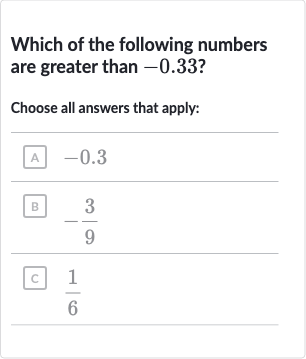Full solution
Q. Which of the following numbers are greater than ?Choose all answers that apply:
- Compare with option A: Compare with option A .Since is closer to zero than , is greater than .
- Compare with option B: Compare with option B . First, simplify to its simplest form. simplifies to , which is equal to (repeating). Since is equal to , it is not greater than .
- Compare with option C: Compare with option C . is a positive number, and since is negative, any positive number is greater than any negative number.Therefore, is greater than .
More problems from Multiplication with rational exponents
QuestionGet tutor help
QuestionGet tutor help
QuestionGet tutor help
QuestionGet tutor help
QuestionGet tutor help
QuestionGet tutor help
QuestionGet tutor help
QuestionGet tutor help
QuestionGet tutor help

